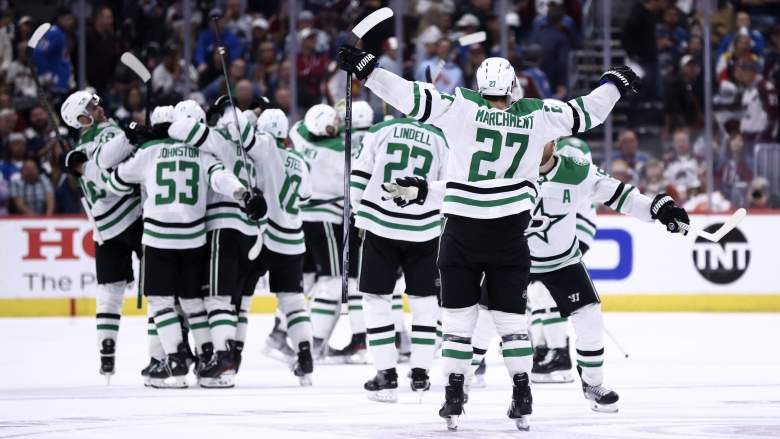
Getty Mason Marchment, Dallas Stars
The Dallas Stars punched their ticket to the Western Conference Final on May 17, and they had to score two overtime goals to do it.
Stars forward Mason Marchment appeared to score a series-clinching goal in the first overtime period of Game 6 against the Colorado Avalanche, but the goal was waved off by officials due to goaltender interference. A video review upheld the “no goal” call on the ice, and the Stars played on into the second overtime period with the game remaining tied 1-1.
The goaltender interference in question occurred when Dallas forward Matt Duchene made contact with Colorado goalie Alexandar Georgiev on the play. Fittingly, it was Duchene who went on to score the game-winning goal in the second overtime to send the Stars to their second consecutive Conference Final.
“It’s indescribable,” Marchment said of his emotions postgame, according to the Dallas Morning News. “You’re so happy and see all the boys hopping over the bench, and then I look over and [the official is] kind of waving it off. I don’t really have a comment on the goal, honestly. Doesn’t really matter now because we won. I thought it was a good goal, but…”
Marchment’s Controversial No-Goal Stirs Up Questions About Goaltender Interference
The no-goal call on Marchment ended up being a moot point thanks to Duchene’s game-winner, but it still raised doubt and uncertainty about what constitutes goaltender interference.
The NHL ‘s explanation of the call is as follows:
“Video review supported the Referee’s call on the ice that Dallas’ Matt Duchene impaired Alexandar Georgiev’s ability to play his position in the crease prior to the puck entering the Colorado net. The decision was made in accordance with Rule 69.1 which states, in part, ‘Goals should be disallowed only if: (1) an attacking player, either by his positioning or by contact, impairs the goalkeeper’s ability to move freely within his crease or defend his goal.'”
NHL Rule 69.1 further states, “If an attacking player has been pushed, shoved, or fouled by a defending player so as to cause him to come into contact with the goalkeeper, such contact will not be deemed contact initiated by the attacking player for purposes of this rule, provided the attacking player has made a reasonable effort to avoid such contact.” There was indeed contact between Duchene and Georgiev on the play in question, but fans and analysts alike argued that it appeared to take place outside of the crease and was due to Colorado defenseman Cale Makar pushing Duchene.
“The explanation that I got was [Duchene’s rear end] was over the line,” Marchment told reporters after the game. “His feet were outside but his [rear end] was over the line. That’s the explanation I got. Then he got pushed in. I think honestly, they didn’t want to make it a deciding goal, right? I get it, but I think there’s got to be some sort of standard because you can’t push a guy into your own goalie and not it be goaltender interference. There’s just got to be some sort of standard, but at the end of the day, it doesn’t really matter. We got the job done. It’s awesome.”
Comments
Stars’ Game 6 Victory Over Avalanche Marred by Controversy